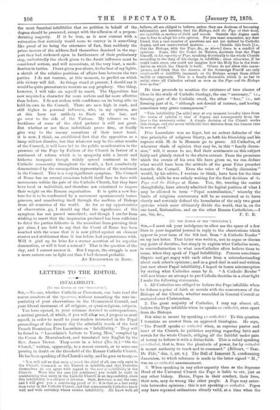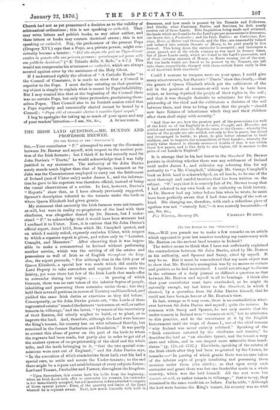[TO TILE EDITOR OF THE "SPECTATOR. ") Sin,—I must ask your
indulgence to allow me the space of a few lines in your impartial journal in reply to the observations which appear in your issue of the Sth inst. from "A Catholic Reader" on my last letter. That letter was written, not to argue or discuss any point of doctrine, but simply to explain what Catholics mean, in contradistinction to what non-Catholics often believe them to mean, when they speak of Papal Infallibility. Persons sometimes dispute and get angry with each other from a misunderstanding about each other's opinions ; and as a good deal is said and written just now about Papal infallibility, I hoped to lessen misconception by stating what Catholics mean by it. "A Catholic Reader" will not blame an attempt to put Catholic doctrine in a clear light I make the following statements.
1. All Catholics are obliged to believe the Pope infallible when he defines a point 'of faith or morals with the concurrence of the Bishops of the Church, whether assembled in General Council or scattered over Christendom.
2. The great majority of Catholics, I may say almost all, believe the Pope infallible when he speaks ex cathedra, even apart from the Bishops.
But what is meant by speaking ex cathedra? To this question I translate an answer from an approved theologian. He says, " The Pontiff speaks ex cathedra when, as supreme pastor and head of the Church, he publishes anything regarding faith and morals for the whole Church, obliging all the faithful under pain of heresy to believe it with a divine faith. This is called speaking ex cathedra, that is, from the plenitude of power, for by cathedra is meant authority to teach and to command." (Billuart, " Trac. De Fide," dim. 4, art. v.) The Bull of Innocent X. condemning Jansenism, to which reference is made in the letter signed " M.," was an ex cathedra announcement.
3. When speaking in any other capacity than as the Supreme Head of the Universal Church the Pope is liable to err, just as any other bishop. Hence, Popes in their conduct, their lives, their acts, may do wrong like other people. A Pope may enter- tain heterodox opinions ; this is not speaking ex cathedra. Popes may have repeated ordinations already valid, at a time when the
Church had not as yet pronounced a decision as to the validity of schismatical ordinations ; this is not speaking ex cathedra. They may write letters and publish books, as any other author, and these letters or books may contain doctrinal errors ; this is not speaking ex cathedra. Nay, the predecessor of the present Pope (Gregory XVI.) says that a Pope, as a private person, might con- ceivably become a heretic : "Dal the siegue the puo un Papa &rent). eretico in quanta alla sea pricata persona quantunquenol possa nelle sue publiche decisioni." ("Il Trionfo della S. Sede," c 4-7.) This would not compromise his utterances. ex cathedra, which are always secured against error by the assistance of the Holy Ghost.
If I understand rightly the allusion of "A Catholic Reader" to the Council of Constance, it is made to show that a Council is superior to the Pope. I must decline entering on that question ; my object is simply to explain what is meant by Papal infallibility. But I may remind him that at the beginning of the Council there was no certain Pope, but only three pretenders, proclaiming them- selves Popes. That Council also in its fortieth session ruled that a Pope regularly and canonically elected cannot be bound by a Council.: "Papa rite et canonice electtm concilio ligari nequit."
I beg to apologize for taking up so much of your space and any of your readers' attention.—I am, Sir, &c., A SUBSCRIBER.



































 Previous page
Previous page